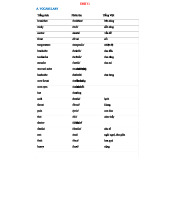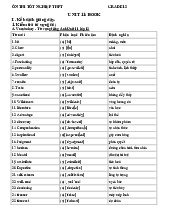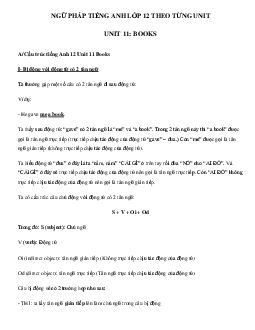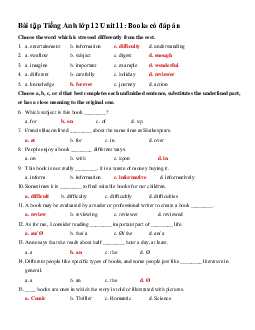











Preview text:
Giải bài tập SGK Tiếng Anh lớp 12: Books
A. Reading (Trang 118-119-120-121 SGK Tiếng Anh 12)
Before you read (Trước khi bạn đọc)
Work in pairs. Ask each other the following questions. (Làm việc theo cặp. Hỏi nhau những câu hỏi sau.)
1. Do you often read books? (Bạn có thường đọc sách không?) => Yes, I do.
2. What kind of books do you enjoy reading most/least? (Bạn thích/ít thích đọc loại sách gì nhất?)
=> I enjoy reading books on science most, but I read novels least.
3. How do you read books? (Bạn đọc sách như thế nào / theo cách nào?)
=> I generally scan its content first lo see if there are any interesting ideas. Then if I have more time, I
read the preface. After that I find time to read it, a few pages a time.
While you read (Trong khi bạn đọc)
Read the text and do the tasks that follow. (Đọc đoạn văn và làm các bài tập theo sau.) Hướng dẫn dịch:
Bàn về việc đọc sách, Francis Bacon, người sống cùng thời với nhà văn Shakespeare, đã
viết như sau "Một số sách cần đọc qua loa, một số khác cần đọc ngốn ngấu, một số ít cần
phải nghiền ngẫm và suy ngẫm". Lời khuyên hay đó chỉ ra các cách khác nhau để đọc
những loại sách khác nhau. Chẳng hạn, bạn có thể lấy một quyển sách về du lịch và đọc
vài trang trước khi đi ngủ. Quyển đó chỉ để cho bạn ghé mắt vào và đọc chút ít chồ này
chỗ nọ. Nói tóm lại, chỉ là đọc qua loa mà thôi.
Vài quyển truyện thì để đọc ngốn ngấu. Cứ tưởng tượng bạn vừa tìm được quyển truyện
hay, và quan trọng hơn nữa là bạn có thì giờ để thưởng thức nó. Có thể bạn đang đi nghỉ
hay đang trên tàu hỏa cho một chuyến đi dài. Nếu đó là quyển sách hay, bạn có thể nói
"quyển này hay tới nỗi tôi không đặt nó xuống được", nhưng không phải sách truyện nào
cũng thuộc loại này. Các nhà phê bình văn học đôi khi mô tả sách là "khó mà đặt xuống"
hay "khó có thể cầm lên lại được".
Có những quyển sách phải đọc chậm rãi và cẩn thận. Nếu đó là quyển sách về chủ đề bạn
ưa thích thì bạn sẽ muốn "nghiền ngẫm và suy ngẫm" nó. Điều đó không có nghĩa là bạn
phải đọc thật chậm. Khi cầm một quyển sách lên lần đầu tiên, bạn phải kiểm tra để biết
chắc là nó không quá khó đọc. Đừng bắt đầu đọc một quyển sách mà không xem qua vài
trang đầu để biết bạn có thể đọc và hiểu nó dễ dàng không.
Một số người nghĩ là khi càng nhiều người có tivi ở nhà thì số người mua sách sẽ càng ít
đi. Tại sao phải đọc sách khi vô tuyến truyền hình có thể mang đến cho bạn tất cả thông
tin và các câu truyện với màu sắc, hình ảnh sống động? Thế nhưng, thật ra, tivi không giết
chết thú đọc sách. Ngày nay, sách các loại được bán nhiều hơn bao giờ hết. Sách vẫn là
một cách ít tốn kém để có thông tin và giải trí, và bạn lại có thể cất giữ sách và đọc lại
nhiều lần. Sách ở nhà chính là một nguồn kiến thức và vui thú tuyệt vời.
Task 1. The following words and phrases all appear in the passage. Find the Vietnamese equivalent for
each of them. (Tất cả những từ và cụm từ xuất hiện ở đoạn văn. Tìm từ tiếng Việt tương đương cho mỗi từ.) Gợi ý:
1. swallow: đọc ngốn ngấu
2. dip into: đọc lướt qua
3. taste: đọc thử, đọc qua loa
4. "hard-to-pick-up-again": khó có thể cầm lên lại
5. digest: đọc và suy ngẫm
6. chew: nghiền ngẫm
7. "hard-to-put-down": không thể đặt xuống
Task 2. Work in pairs. Decide whether the statements are true (T) or false (F) or ... . (Làm việc theo
cặp. Xác định xem các phát biểu sau là đúng (T) hay sai (F) hay chưa được đề cập đến (NM) trong bài
đọc. Tích dấu vào ô thích hợp.) Gợi ý: 1. NM 2. F 3. NM 4. T 5. F
Task 3. Answer the questions according to the information in the passage. (Trả lời câu hỏi dựa theo
thông tin trong đoạn văn.)
1. How many ways of reading are there? (Có bao nhiêu cách đọc sách?) => There are three.
2. When might you "swallow" a book? (Khi nào người ta "đọc ngốn ngấu" một quyển sách?)
=> When you find a good story and have time to enjoy it.
3. What should you do before starting to read a book carefully and slowly? (Ta nên làm gì trước khi bắt
đầu đọc một quyển sách một cách kỹ lưỡng và chậm rãi?)
=> Read a few pages to see if it's the one you can read and understand it easily.
4. What are the advantages of television over books? (Đâu là ưu điểm của truyền hình khi so sánh với sách?)
=> Televisions can bring you the information and stories with colour, pictures and actions.
5. What are the advantages of books over television? (Đâu là ưu điểm của sách khi so sánh với truyền hình?)
=> Books are still a cheap way to get information and entertainment. And moreover you can keep a
book forever and read it at any time and again and again.
After you read (Sau khi bạn đọc)
Work in pairs or groups. Find the names of types of books in the square. The word ... .(Làm việc theo
cặp hoặc nhóm. Tìm tên của các loại sách trong hình vuông. Các từ có thể nằm ngang, dọc, lên, ngược,
hoặc xiên. Đây là một vài gợi ý.) Gợi ý: a. thriller b. romance c. novel d. science e. craft f. Fiction g. comic h. biography
B. Speaking (Trang 122 SGK Tiếng Anh 12)
Task 1. Work in pairs. Complete the following conversation and practise reading it. (Làm việc theo
cặp. Hoàn thành đoạn hội thoại sau và thực hành đọc.) Gợi ý: Conversation 1
A: What sort of books do you Iike reading?
A: How do you often read books?
A: When do you often read books?
Task 2. Work in pairs. Ask and answer about each other's reading habits, using the questions in the
conversation. (Làm việc theo cặp. Lẫn nhau hỏi và trả lời về thói quen đọc sách, sử dụng những câu hỏi ở bài hội thoại.)
Gợi ý hỏi và trả lời:
A: What sort of books do you read?
B: I like reading books on science and history.
A: Why do you like reading these kinds of books?
B: Well, books on science show us how things work and affect our lives, and history books tell us the
important events and figures that we can withdraw some useful lessons for us from the variety of
spheres of life, intellectual and moral.
A: Then how do you read books?
B: There are various ways of reading books. But according to me, reading the content of the book first
to see if it contains any interesting ideas, then I read the preface if I have time.
A: How do you often read books?
B: Usually I read them in my free time. I also read books on my long trip or journey.
A: Where do you often read books? B: Usually at home.
A: Do you think a library is an appropriate place to read books?
B: Sure, no other better place.
Task 3. Work in pairs. Complete the following conversation and practise reading it. (Làm việc theo
cặp. Hoàn thành đoạn hội thoại sau và thực hành đọc.) Gợi ý: Conversation 2
A: What are you reading at the moment?
A: Who is the main character?
A: What is he like?
Task 4. Work in pairs. Ask and answer about the book you are reading or you have read. Note down
the answers. (Làm việc theo cặp. Hỏi và trả lời về cuốn sách bạn đang đọc hoặc bạn đã đọc. Ghi lại các câu trả lời.) Gợi ý:
A: What are you reading at the moment?
B: At this moment? I'm reading "Die Another Day".
A: Who is the main character?
B: The main character is James Bond – 007. A: What is he like?
B: He is very brave, talented, handsome, intelligent and humorous. He struggled against terrorism and saved the world from the war.
Task 5. Work in groups. Report the results to the group. (Làm việc nhóm. Tường thuật kết quả tới nhóm.) Gợi ý:
- At the moment, Nam is reading "Die Another Day" – a detective story. The main
character is James Bond – 007. He is very brave, talented, handsome, intelligent and
humorous. He struggled against terrorism and saved the world from the war.
C. Listening (Trang 123-124 SGK Tiếng Anh 12)
Before you listen (Trước khi bạn nghe)
- Work in pairs. Your partner has just read an interesting book. What questions do you ... . (Làm việc
theo cặp. Bạn học của em vừa đọc một cuốn sách hay. Bạn hỏi bạn ấy những câu hỏi nào để tìm hiểu về
cuốn sách càng nhiều càng tốt?)
Các câu hỏi gợi ý:
+ Have you read any book recently?
+ What's the title of the book?
+ What's the sort of the book? + Who's the author?
+ What does the book tell about? + What's the plot?
+ What can you get from the book?
+ What of the book interests you most? - Listen and repeat.
incredible: không thể tin được
wilderness: nơi hoang fascinating: say mê, hấp vu dẫn
unnoticed: không ai để ý, bị bỏ journey: hành trình personality: nhân qua cách/phẩm survive: sống reunited: hợp nhất lại
While you listen (Trong khi bạn nghe)
Listen to a woman talking about the book that she has just read and do the tasks that follow. (Nghe một
phụ nữ nói về quyển sách bà ấy vừa đọc và làm bài tập theo sau.)
Task 1. Circle the correct answer A, B or C. (Khoanh tròn câu trả lời A, B hoặc C đúng nhất.) Gợi ý: 1. B 2. C 3. B 4. A 5. A
Task 2. Listen again and fill in the gaps in the passage. (Nghe lại và điền các chỗ trống trong đoạn văn.) Gợi ý: 1. family 2. strength 3. humans 4. journey 5. pet
After you listen (Sau khi bạn nghe)
Work in pairs. Ask and answer the question: Would you like to read the book or wouldn't you? Why
/Why not? (Làm việc theo cặp. Hỏi và trả lời câu hỏi: Em có thích đọc sách không? Tại sao thích/ Tại sao không?) Gợi ý:
Các bạn có thể chọn một trong các lý do sau:
Yes, I would like to read book. Because I read books:
- to get information and a better understanding of what we learn.
- to widen and improve our knowledge.
- to raise our awareness of the good things to do and the bad things to avoid. - to relax our mind.
Tapescript - Nội dung bài nghe
D. Writing (Trang 124-125 SGK Tiếng Anh 12)
Writing a book report (Viết báo cáo về một cuốn sách)
Task 1. Below are questions you have to answer when writing a report on a book, but ... . (Dưới đây là
các câu hỏi bạn phải trả lời khi viết báo cáo về một cuốn sách, nhưng chúng đã bị sắp lộn xộn. Làm việc
với bạn học. Đặt các câu hỏi dưới các đầu đề đúng.) Gợi ý: HEADINGS
General introduction
7. What is the title of the book? 4. Who is the author? 9. What type of book is it?
Summary of the book's content 2. Where is the book set?
5. What is the main theme of the story?
6. Who are the main characters?
8. What is the plot of the story? Conclusion
1. What was your opinion of the book?
3. Would you recommend the book?
Task 2. Work in pairs. Ask and answer the above questions about a book you have just read. (Làm
việc theo cặp. Hỏi và trả lời các câu hỏi trên về quyển sách bạn vừa đọc.) Gợi ý:
A: Have you read a book lately? B: Oh, yes.
A: What's the title of the book? B: "The Sea Wolf". A: Who's the author? B: Jack London.
A: What type of book is it?
B: A novel on love and violence.
A: Where is the book set?
B: On a pirate's ship on the Pacific Ocean.
A: What's the main theme of the book?
B: Cruelty, Strength and Love.
A: What are the main characters?
B: Wolf Larsen, a cruel captain, Van Weyden and Maud Brewster.
A: What's your opinion on the book?
B: It's an interesting book.
Task 3. Write a report on the book you have read recently based on the results of Tasks 1 and 2. (Viết
bản báo cáo về cuốn sách em mới đọc gần đây dựa vào kết quả của Bài tập 1 và 2.) Gợi ý:
Recently I've read a book "The Sea Wolf" by Jack London. It's a novel. The story is set on a
sealer owned by a cruel and strong captain. Wolf Larsen with two other characters, Van
Weyden, a literature reseacher and a woman writer Maud Brewster. Through the whole
story, it can be said the true love and charity can defeat the cruelty. In a word; the true love
always wins. This book is a very interesting novel which evokes in our depth a human
feeling about the strength of love.
E. Language Focus (Trang 126-127 SGK Tiếng Anh 12) Grammar
Exercise 1. Rewrite the sentences in the passive. (Viết lại các câu ở thể bị động.) Gợi ý:
1. This machine mustn't be used after 5.30 pm.
2. This machine must be cleaned every time you use it.
3. The flowers should be kept in a warm sunny place.
4. Your bill should be paid before you leave the hotel.
5. The information should be given to us now.
6. Toothpaste can be bought at the drug store.
7. The children should be warned not to speak to strangers.
8. The mystery can't be solved.
9. Travellers' cheques can be exchanged at most banks.
10. The news shouldn't be told to her. She might be killed by it.
Exercise 2. Following is a conversation between two characters in a science fiction ... . (Sau đây là cuộc
hội thoại giữa hai nhân vật trong một cuốn sách khoa học viễn tưởng về du lịch vũ trụ. Hoàn thành đoạn
hội thoại với thể bị động thích hợp của các động từ trong ngoặc.) Gợi ý: 1. will be prepared 2. Is food going to be cooked 3. will be pre-packaged 4. can be warmed 5. should (food) be chosen 6. has to be offered 7. could be selected 8. ought to be made



